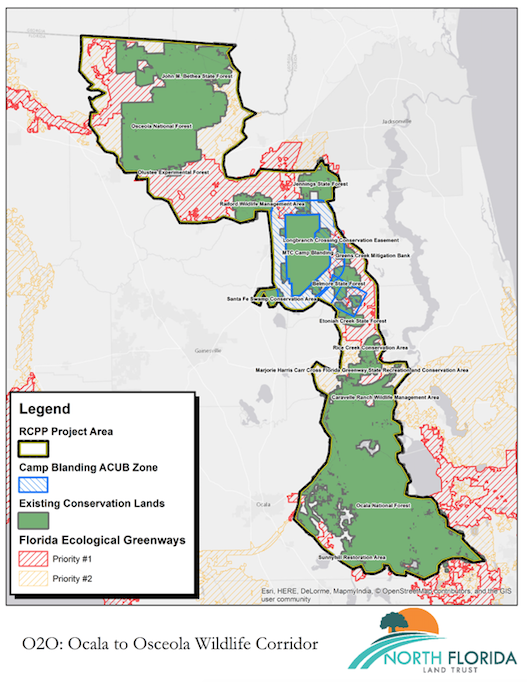North Florida Land Trust
Media Release
June 5, 2018 1:00 p.m.
Jacksonville, Fla., June 5, 2018 – North Florida Land Trust extends their congratulations to Camp Blanding for being named the top military installation for conservation in the country. Camp Blanding Joint Training Center received the 2018 Military Conservation Partner Award, which is given annually by the U.S. Fish and Wildlife Service to the military installation that has done outstanding work to promote conservation on military lands. Camp Blanding was recognized for their work in conserving and rehabilitating the endangered red-cockaded woodpecker.

Camp Blanding is located in what is known as the O2O corridor, a nationally critical wildlife corridor that stretches from the Ocala National Forest to the Osceola National Forest and eventually to the Okefenokee Swamp in Georgia. NFLT is currently leading two conservation programs to preserve lands within this corridor; The Regional Conservation Partnership Program with the Natural Resources Conservation Service and the Army Compatible Use Buffer partnership with the Florida National Guard who operate Camp Blanding. The conservation efforts within this corridor are beneficial to several endangered species like the red-cockaded woodpecker, gopher tortoise, indigo snake and many others.
“Camp Blanding has been great to work with in our conservation efforts along the O2O and we are proud to be a partner with the most conservation minded military installation in the country,” said Jim McCarthy, president of NFLT. “Camp Blanding has already worked with us to preserve 1,100 acres of conservation land and there are more properties we are working together to preserve.”
NFLT first entered into a partnership with Camp Blanding in 2016 when they acquired more than 600 acres of land in Bradford County adjacent to Camp Blanding Joint Training Center in Clay County, which was a prime candidate for conservation and important to protect the base form the threat of encroaching development. NFLT worked closely with Paul Catlett, the Forestry Program Administrator for Camp Blanding, on the original conservation efforts and the partnership has since grown into a mutually beneficial effort for both organizations.
“The work Paul has done at Camp Blanding and the surrounding conservation lands is a model for all military installations,” said Marc Hudson, land protection director for NFLT. “Paul has been a wonderful partner in conservation and the work we are doing together around the installation has a huge benefit for both the environment and for the soldiers. We are able to help Camp Blanding with its mission as we move forward in our mission to protect wildlife in the O2O corridor.”
Camp Blanding’s work with the red-cockaded woodpecker is part of a program to rebuild and rehabilitate endangered populations and expand habitats that was created within an agreement between the military and U.S. Fish and Wildlife known as the Candidate Conservation Agreement with Assurances. The program enacts policies to restore and protect dwindling wildlifeand allows soldiers and airmen access to training grounds to continue their preparation for military missions.
About North Florida Land Trust
North Florida Land Trust is a non-profit organization who serves as a champion of environmental protection primarily in Baker, Bradford, Clay, Duval, Flagler, Nassau, Putnam, St. Johns, Union and Volusia counties. NFLT was founded in 1999 and has protected thousands of acres of environmentally significant land including property at Big Talbot Island, the River Branch Preserve, Pumpkin Hill State Park, Moccasin Slough, along the St. Mary’s River and other valued natural areas predominantly in Northeast Florida. NFLT is funded largely by private and corporate contributions and works closely with private landowners and other public agencies at all levels of government, not-for-profit partners, and foundations. For more information, visit www.nflt.org.
